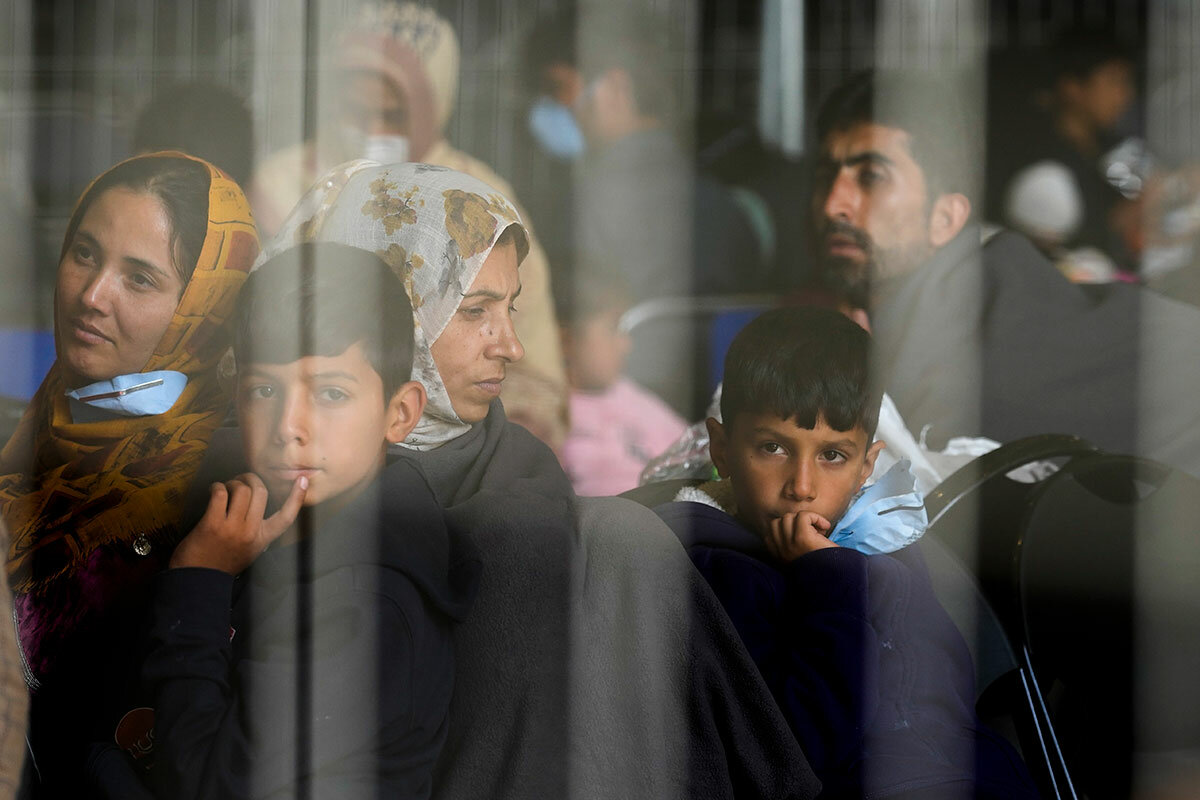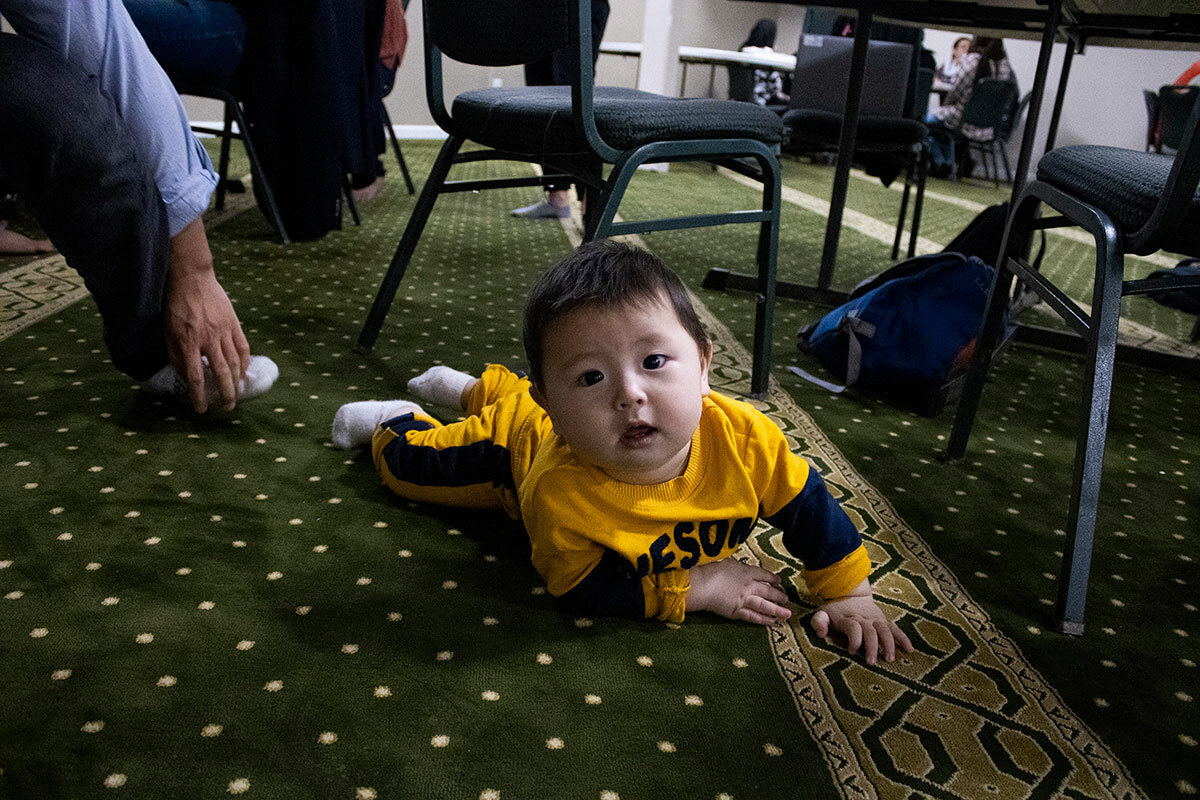For Afghans in the US – life, liberty, and the pursuit of permanence
Loading...
| Denver
Aida takes kicks to her stomach with a stone-faced focus. Her own kick has the precision of a whip, hitting hand-held pads with a thwack.
Between drills at the Monday night muay thai class, Aida breaks into a bright blue smile, mouthguard over teeth. She and sister Maryam are popular at the Denver gym, often smothered by classmates’ hugs.
“Without my family, it is so hard for me,” Maryam says in Dari, translated through her sister. But training here helps, “because they are like my family.”
Why We Wrote This
Over the past year, tens of thousands of Afghans have rebuilt their lives in the U.S. Finding safety, however, doesn’t always come with a sense of security.
The Afghan athletes landed in the United States in September 2021, a month after the Taliban swept to power and U.S. forces withdrew, bringing a chaotic end to America’s longest-ever war after 20 years. The Monitor agreed not to use the real names of Aida and Maryam for fear of reprisals from the Taliban against their family.
Like tens of thousands of others, the sisters are here on temporary humanitarian parole,Ã˝resettled like refugees but without the same prospects for permanence. However, beginning next month, the U.S. will move away from this model, which allowed for speedier processing of at-risk Afghan arrivals.
Afghan evacuees across the country describe their first year here as a blend of gratitude and grief, resilience with the ache of separation. After all, forging new lives meant leaving loved ones behind ‚ÄìÃ˝parents and siblings, for Aida and Maryam. And while Afghans have found safety in the U.S., without direct paths to permanent residence, many still seek a sense of security.
“I feel like I’m part of something good,” says Edrees, an Afghan parolee, about being welcomed in Kentucky. But then he asks, “What’s going to happen next?”
For starters, leaving family behind
Around 85,000 Afghans have arrived in the U.S. through , according to U.S. Citizenship and Immigration Services.Ã˝
In a late-August email, USCIS spokesperson Matthew Bourke said, “We are prepared to welcome additional Afghans over the coming weeks and months, including those who are at overseas transit locations awaiting clearance to come to the United States.”
Thousands were evacuated last summer amid haphazard scenes at Kabul Airport.Ã˝
‚ÄúWe didn‚Äôt have any choice, because we were in danger,‚Äù says Mahnaz Akbari, who resettled in Maryland. She used to command the Female Tactical Platoon in the Afghan National Army, elite soldiers trained by U.S. special operations forces.Ã˝
There was grim irony in escaping Kabul on military aircraft ‚Äì similar to planes she used to love taking, province-hopping for missions. Some male Afghan colleagues who remained, she says, have been missing, imprisoned, or killed by the Taliban.Ã˝
“I wanted peace in Afghanistan,” she says.
Many like her, with U.S. ties, fled with the help of American contacts. Some became separated from family members amid the airport confusion. Ahmad evacuated on military aircraft with two young sons on Aug. 16, 2021, but couldn’t reach his wife via cellphone in time to have her and their daughter join from outside the airport.
‚ÄúI was hopeless,‚ÄùÃ˝says Ahmad, who worked for the Afghan government and now raises his 2-year-old and 9-year-old sons alone in Los Angeles. (Like other sources in this story, he declined to publish his last name for security reasons.)
Ahmad is desperately seeking a way to reunite with his family, and has inquired with the U.S. government and advocacy groups. Whether at the beach or at a party, he says, “I’m just thinking of my wife.”
Prior to resettling across the U.S., many Afghans stayed for months on military bases.
“Everybody got depression,” recalls Aida, who spent five months with her sister at Fort McCoy in Wisconsin. She says some young women resorted to self-harm.
Aida and her sister settled into an apartment in the Denver area in March, among 2,545 Afghan evacuees to arrive in the state since July 31, 2021, according to the Colorado Department of Human Services. Nearly 9 out of 10 have been parolees like them.
Aida says six months‚Äô worth of rental assistance has just run out, meaning theÃ˝sisters are now on the hook for the $1,600 of rent. With a work authorization, Aida answers calls and schedules appointments at a dental clinic. But home is never far from thought.
‚ÄúWhenever we go to our work and I see the families, they are talking to each other. ... I really feel sad,‚Äù says Aida.Ã˝
And yet, life here has also brought relief and newfound liberties. Sara, an Afghan ∫£Ω«¥Û…Ò, says ‚Äúof course‚Äù she feels safer in the U.S. She has resettled in Colorado Springs, Colorado, and has begun community college.
‚ÄúI have freedom. I can go to work. I can do anything I want to do ‚Äì and I can drive, like I couldn‚Äôt in Afghanistan,‚Äù says Sara, who shuttles herself to two restaurant jobs.Ã˝
After scoring her driver’s license last winter, “I was driving everywhere,” she says, laughing. “I was so happy.”
On a recent Saturday, Aida talks to a toddler in Dari on the gold-green carpet of a Northglenn mosque, about 25 minutes north of Denver. She‚Äôs just finished interpreting for fellow Afghans during an asylum workshop here. Aida filed for asylum herself earlier this year.Ã˝
‚ÄúIt really feels good for me to help,‚ÄùÃ˝says the Afghan athlete.Ã˝
Back in Afghanistan, she had worked to convince her parents that girls belonged in sports. The sisters ended up on a national team and competed internationally, but at the expense of pushback from neighbors and relatives ‚ÄìÃ˝including one family member who cut ties with them.
Women‚Äôs sports seem unthinkable in post-U.S. Afghanistan, where Taliban governance is violating the human rights of women and girls ‚Äúrelated to education, work, free movement and clothing,‚Äù according to an Amnesty International .Ã˝
During the asylum workshop, the prayer rooms of the mosque fill with difficult stories. Afghans describe what they‚Äôre fleeing to attorneys and other strangers, volunteers hunched over binders of paperwork as they help fill out forms.Ã˝
The stories are ‚Äúvery, very traumatic,‚Äù some involving torture, says Shams, an Afghan social activist who arrived in 2016. He also serves as an interpreter for workshops like this at Metropolitan Denver North Islamic Center, also called Masjid Ikhlas.Ã˝
Beyond the waiting game of asylum, there‚Äôs the issue of assimilation. While evacuees like Aida may be privileged with their skills in English, many can‚Äôt speak it ‚ÄìÃ˝much less read or write in their native languages, says Shams.
News reporting from to coasts recounts Afghans‚Äô added struggle of making rent in costly urban areas, especially for those who arrived with several family members to house.Ã˝
Tackling the bureaucracy
Of those 85,000 Afghan arrivals, more than 77,000 were paroled into the U.S. for , per USCIS. Unlike refugees and those granted asylum, parolees do not have a direct path to permanent residence and future citizenship. That means parolees may end up living in the U.S. unauthorized after two years if they don‚Äôt adjust their status. However, the Biden administration recently announced that,Ã˝beginning Oct. 1,Ã˝it willÃ˝Ã˝the Afghan parole process ‚Äì for which thousands of applicants still abroad haven't been approved ‚Äì to prioritize long-term resettlement strategies. Immediate family of U.S. citizens, permanent residents, and resettled evacuees; Special Immigrant Visa qualifiers; and certain refugee program applicants will constitute the focus of resettlement efforts moving forward, according to news reports.
In the U.S., many parolees in pursuit of permanent residence have been trying for asylum, such as through the weekend workshop that began as a volunteer effort earlier this year, first reported by . Many applicants ask about family left behind.
‚ÄúThat‚Äôs the most common question I get, and the most heartbreaking one I have to answer, because there is no way to bring people over here from Afghanistan,‚Äù says Tracy Harper, immigration attorney and asylum workshop coordinatorÃ˝at Catholic Charities in Denver, whose volunteers have helped prepare over 300 applications.Ã˝‚ÄúMy general advice is they need to get out and they need to apply for refugee status in another country,‚ÄùÃ˝she told the Monitor before news broke about the next phase of Afghan resettlement.
Ms. Harper‚Äôs Colorado Afghan Legal Project isn‚Äôt alone. As of Aug. 28, USCIS has received around 4,600 asylum applications from Afghan evacuees ‚Äì including nearly 300 applications approved and one denied, according to the agency. (Though more than 430,000 such cases have been pending in an overall agencyÃ˝Ã˝covering many countries, USCIS is required to expedite asylum applications from Afghan nationals here on parole.)
Asylum-seekers must apply for asylum within a year of entering the U.S. Though the Department of Homeland Security has suggested that recently arrived Afghans may qualify for an “extraordinary circumstances” exception to this rule, lawyers like Ms. Harper continue to act with a sense of urgency, to be safe.
The legal limbo has also prompted advocates to push for the passage of the Afghan Adjustment Act. Introduced in the Senate in August, the would let parolees who undergo additional vetting apply for green cards ‚ÄìÃ˝similar to adjustments made for Vietnamese evacuees in the 1970s.Ã˝
Edrees in Kentucky, who says he faces “certain death” back home, wants the Afghan Adjustment Act to pass to end the uncertainty he and others experience with humanitarian parole.
“This is not the way you treat your allies,” he says.
A former Afghan translator for the State Department, Edrees applied for a Special Immigrant Visa in August 2021. He says he applied again this August due to an application denial that he believes was made in errorÃ˝‚Äì a denial by a federal agency that once employed him.
Frustrations with American bureaucracy aside, he doesn‚Äôt blame the U.S. for leaving his homeland after two decades.Ã˝
“U.S. mothers needed their sons back home eventually,” he says.
Plans, and hopes for the future
Like sisters Aida and Maryam, Edrees stays afloat by keeping busy. He has a job, which helped him buy a car, and has learned to cope with hard emotions by heading to the park. Edrees runs, and runs, and runs until he feels “good” again.
As a former lawyer in Afghanistan, he would like to attend law school here, though he‚Äôs aware of the expense. Sanga in Texas also has her sights on the future.Ã˝Ã˝
“I have a lot of goals,” she says. Interfaith Ministries for Greater Houston has helped resettle her family, which includes a son born a U.S. citizen this spring.
‚ÄúI want a bright future for my children,‚Äù says Sanga, who was threatened for her work with the U.S. Agency for International Development. ‚ÄúI want to improve my education and get my master‚Äôs degree, Ph.D.‚ÄùÃ˝
Likewise, Aida and Maryam hope to find college scholarships to begin studies here.Ã˝
Back in Denver, a tropical humidity hangs in the gym by the end of the muay thai class. Aida and Maryam finish crunches with the rest of the group, then joke with their coach and say goodbyes.Ã˝
“Everyone here loves them,” says Amy Reininger, who drilled with Maryam during practice. “They’ve been through so much, but they’re so inspiring to all of us.”
The sisters exit into the night, catching a ride back home. Their mother won’t be there to welcome them with a warm kidney bean curry or ask about their day. It’s unclear when that will happen again.
But they will be back at the gym tomorrow, back for a workout and more.











